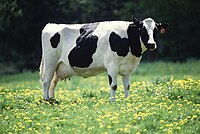
Photo from wikipedia
abstract Experiments investigating grazing systems have often excluded ranch-scale decision making, which has limited our understanding of the processes and consequences of adaptive management. We conducted interviews and vegetation monitoring… Click to show full abstract
abstract Experiments investigating grazing systems have often excluded ranch-scale decision making, which has limited our understanding of the processes and consequences of adaptive management. We conducted interviews and vegetation monitoring on 17 ranches in eastern Colorado and eastern Wyoming to investigate rancher decision-making processes and the associated ecological consequences. Management variables investigated were grazing strategy, grazing intensity, planning style, and operation type. Ecological attributes included the relative abundance of plant functional groups and categories of ground cover. We examined the environmental and management correlates of plant species and functional group composition using nonmetric multidimensional scaling and linear mixed models. After accounting for environmental variation across the study region, species composition did not differ between grazing management strategy and planning style. Operation type was significantly correlated with plant community composition. Integrated cow-calf plus yearling operations had greater annual and less key perennial cool-season grass species cover relative to cow-calf−only operations. Integrated cow-calf plus yearling ranches were able to more rapidly restock following drought compared with cow-calf operations. Differences in types of livestock operations contributed to variability in plant species composition across the landscape that may support diverse native faunal species in these rangeland ecosystems. Three broad themes emerged from the interviews: 1) long-term goals, 2) flexibility, and 3) adaptive learning. Stocking-rate decisions appear to be slow, path-dependent choices that are shaped by broader social, economic, and political dynamics. Ranchers described having greater flexibility in altering grazing strategies than ranch-level, long-term, annual stocking rates. These results reflect the complexity of the social-ecological systems ranchers navigate in their adaptive decision-making processes. Ranch decision-making process diversity within these environments precludes development of a single “best” strategy to manage livestock grazing.
Journal Title: Rangeland Ecology and Management
Year Published: 2018
Link to full text (if available)
Share on Social Media: Sign Up to like & get
recommendations!